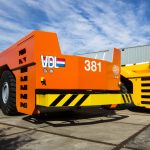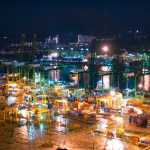Durapower Group, Ecomar Propulsion And The University Of Exeter Join Hands To Boost Sustainable Shipping
• Keeping in line with the world’s aims of gradually reducing carbon emissions, the consortium plans to scale-up Ecomar Propulsion’s zero emission systems for large vessels.
• The collaboration is a result of the consortium’s participation in the 2nd Eureka Globalstars-Singapore Call; the funding support received will be essential in furthering the Research & Development on hydrogen power to recharge Lithium-Ion Batteries.
Singapore, 14 July 2021 – Durapower Group, together with strategic partners Ecomar Propulsion and the University of Exeter, is pleased to announce that the consortium will work towards developing new Zero Emission Powertrain Systems for Maritime vessels, with grant support awarded through the 2nd Eureka Globalstars-Singapore Call. The project is in line with the International Maritime Organisation’s (IMO) goal to halve carbon emissions by 2050 and boost sustainable shipping.
The partnership has been made possible through the consortium’s participation in the 2nd Eureka Globalstars-Singapore Call, organised by the Eureka network and Enterprise Singapore in May 2020. This initiative is a joint funding programme to catalyse co-innovation projects between entities from Singapore and 14 participating Eureka member countries. The grant awarded to the consortium is jointly funded by Enterprise Singapore and Innovate UK.
This funding marks a significant milestone in the consortium’s journey towards supporting international efforts to tackle climate change, eventually allowing larger vessels, tankers and freighters to steer free of emissions. As the world looks to address the impact of climate change through innovative green technologies, the need for eco-friendly propulsion systems in the maritime sector becomes crucial. Already, shipping emits approximately 940 million tonnes3 of exhaust gases, placing the maritime sector in sixth place of the world’s Greenhouse Gas emitting industries. To meet the IMO’s aim of reducing carbon emissions in shipping by 40%4, Durapower Group will be supporting Ecomar Propulsion and The University of Exeter in the development of large battery systems to power green shipping.
Durapower Group is also a participant in Enterprise Singapore’s Scale-up SG programme, and works closely with the agency on its growth plans to further expand globally.
Ecomar Propulsion’s Energy-efficient Propulsion System
Globally, the shipping sector is responsible for transporting over 80% of all goods traded5. From cruise liners and tugs to tankers, most vessels travel in environmentally-sensitive regions. Hence, breakthroughs in green shipping technology are essential. One critical next step is to advance the research into hybrid hydrogen on-board -power for recharge of lithium-ion batteries are underway. These advances are expected to impact a multitude of large-scale commercial applications, including vessels.
Designed with both the environment and ship owners in mind, Ecomar Propulsion’s energy-efficient systems will soon be installed on smaller-sized vessels such as fishing vessels and harbour craft. All components of the power generation solution, including the control strategy, battery charger, motors, cooling and exhaust systems offer significant emissions and fuel savings.
Says Kelvin Lim, Chief Executive Officer, Durapower Group: “We’re delighted to be working hand-in-hand with both The University of Exeter and Ecomar Propulsion to help electrify the engineering company’s propulsion systems with our high-performance lithium-ion battery solutions for future commercial applications, particularly for vessels. We’ve been brought together as a result of the Eureka Globalstars-Singapore Call. The funding and support from Enterprise Singapore and Innovate UK will enable all parties to play a transformational role in the maritime sector, helping the industry eliminate or reduce the amount of carbon emissions produced by vessels of sizes.”
Says Anthony Bennett, Senior Executive Director, Ecomar Propulsion: “Marine is one of the most polluting types of transport in the world and we want to help change that. Our powertrains are totally clean; we remove the diesel and petrol polluting engines from the vessels, and we install zero emissions alternatives powered by battery and hydrogen cells. This project concentrates mainly on the batteries.”
Adds Ecomar Propulsion’s Managing Director, Eugene Bari: “We work exclusively with commercial marine organisations. Adding a 1MWh marine capability greatly enhances our profile and capabilities for commercial organisations. Shipping needs bigger systems which take huge investment and without this funding, we wouldn’t have been able to develop the one-megawatt-hour system with our partners in Singapore so quickly.”
Professor Chris Smith at The University of Exeter says: “The integration of clean power technology into maritime powertrains is challenging and fast changing. Issues concerning multiple fuel types, rapid changes in prices of key components such as batteries, fuel cells, and motors make systems integration together into vessels capable of carrying out their usual roles very challenging. Our AI-enabled simulation code, refined over several years, can design zero emissions powertrains to meet the task and with lowest possible costs.”
Durapower Group’s Contributions To Environmental Sustainability
Since 2012, Durapower Group has been active in the Maritime sector, electrifying port equipment and vessels of sizes by delivering innovative lithium-ion batteries and energy storage solutions (ESS) for commercial vessels that deliver actual Returns On Investments.
In addition to boosting sustainable shipping activities, Durapower Group is also reinforcing its commitment to protect the planet by highlighting its key environmental sustainability initiatives. Backed by strong global demand for innovative solutions that are clean and green, Durapower Group aims to become a key solutions provider in the maritime sector, offering a diverse range of energy-efficient marine-related Lithium-Ion Battery and containerised Energy Storage Solutions that will benefit both ship owners and ports of call.
1 Enterprise Singapore is the government agency championing enterprise development in Singapore. Eureka is an intergovernmental network established in 1985, which supports market-oriented R&D and innovation projects by industry, research centres and universities across all technological sectors.
2 The 2nd Eureka Globalstars-Singapore Call supports the facilitation and funding of joint innovation projects between entities from Singapore and 14 participating Eureka member countries, namely Austria, Belgium (Flanders), Canada, Estonia, Hungary, the Netherlands, Poland, South Africa, South Korea, Spain, Switzerland, Turkey, Ukraine, and the United Kingdom.
3 European Commission, Reducing Emissions From The Shipping Sector, accessed 12 July 2021.
4 IISD Knowledge Hub, IMO Advances Measures To Reduce Emissions From International Shipping, accessed 12 July 2021.
About Durapower Group
Headquartered in Singapore, Durapower offers closed-loop, end-to-end energy storage solutions for the electric mobility and renewable energy applications including on and off-road Electric, Hybrid and Plug-in Hybrid Electric Vehicles, electric marine vessel and stationary energy storage solutions. Since 2009, Durapower has been a leading innovator of Lithium-Ion cell technology, focusing on the research and development of battery materials, battery cell manufacturing and system integration. With a global presence spanning 25 countries and 70 cities, including European Countries, China, India and Southeast Asia. Durapower Group strives to make scalable, sustainable batteries that support the circular economy, empowering lives and transforming the future towards a carbon-neutral economy. Durapower does not manufacture, sell or distribute batteries intended for use in relation to household or consumer electronics.
About Ecomar Propulsion
Ecomar Propulsion Ltd is a UK based engineering company working to reduce global emissions by creating innovative electric marine engines which aim to cut 1 million tonnes of carbon emissions and millions of litres of fuel waste. Ecomar research, develop and produce high performance electric & hybrid marine engines which will be launched on the market in 2022. The two main products are inboard engines for commercial vessels, and outboard engines, with plans to develop hybrid systems for the shipping industry
Centre For Future Clean Mobility At The University of Exeter
The Centre for Future Clean Mobility at the University of Exeter stands at the forefront of the road to zero carbon. We specialise in developing new hybrid and electric powertrain technology for cleaner mobility of humans and goods. We are committed to leading the next generation of clean mobility, which will make our streets, railways, farms, skies, seas and waterways, cleaner and greener.





